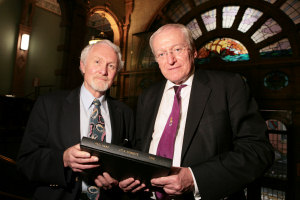Long lost thesis sparks Manchester memories for nuclear man
29 Jul 2008
A leading figure in the nuclear engineering industry has been reunited with a long lost PhD thesis he completed 40 years ago – thanks to the efforts of staff at The University of Manchester

After gaining a first-class honours degree in Metallurgy, Dr Adrian Roberts finished his doctorate in August 1968 before leaving to work at the Argonne National Lab, near Chicago.
During his successful career, Dr Roberts has held several senior roles at Battelle, including interim laboratory director at the Pacific Northwest National Laboratory in Richland Washington.
Dr Roberts is now semi-retired but is currently advising Battelle on opportunities for involvement in the UK National Nuclear Laboratory (NNL) – and is increasingly finding himself back in Manchester.
The University’s Dalton Nuclear Research Institute has enjoyed a close strategic relationship with Battelle since 2006, when the two parties signed a collaborative agreement to develop and implement joint research and education programs and identify potential areas for co-operation and involvement in the proposed UK National Nuclear Laboratory (NNL).
And when staff in the Faculty of Engineering and Physical Sciences met Mr Roberts and found out he had misplaced his thesis, they set about tracking one down in the University’s archives.
A new leather bound copy was presented to Dr Roberts during a recent visit to The University by Prof John Perkins, Vice President and Dean of The Faculty of Engineering and Physical Sciences (EPS).
British-born Dr Roberts, who now lives in Portland, Oregon in the United States, said: “Receiving a copy of my thesis brought back heaps of memories. I recall building complex machines at the back of the Metallurgy Department in a special vibration free basement. The building where the department was based is now the cafe for the Manchester Museum on Oxford Road.
“I recall breaking off for coffee each day at around 10am and reviewing the racing form guide so we could lay our half crown bets on the horses before lunch. There was a betting shop just across the street which was very popular with the students at Manchester.
“The university was small back then with around 5,000 to 6,000 students, so we had small classes and plenty of space in the gym and in the Union. I remember rag weeks as being quite wild with lots of beer and curry and also a ‘Bogle’ walk from Manchester to Lancaster totalling 50 miles.
“It’s a real mystery where my copy of my thesis went to. My best guess is that I mislaid it during a sabbatical year at Cornell University in 1979. I certainly didn't have it when I moved to Pacific Northwest Nat Lab in 1985.
Dr Roberts also has a constant reminder of his time in Manchester, sitting right under his nose. “I grew a beard there while writing the last sections of my PhD. I still have it 40 years later – I never shaved it off!
He added: “Manchester has changed a lot in 40 years but one thing is constant - the high quality of the people, whether scientists or administrators. They all impress me and my US colleagues with their acumen and they are true team players. Battelle and The University will continue to have a very successful partnership long after I have left the scene, because of the foundations established by the current team.”
